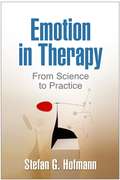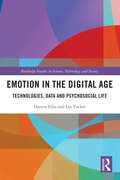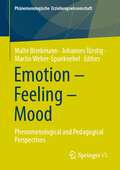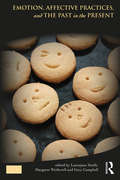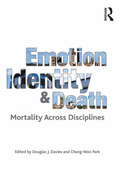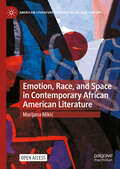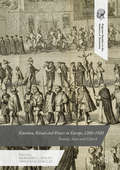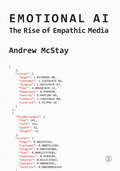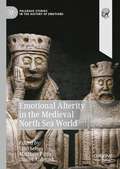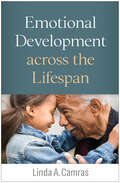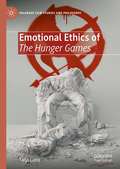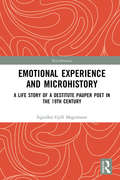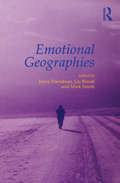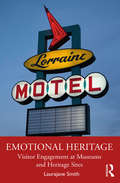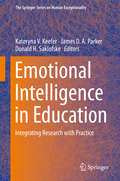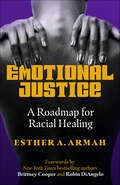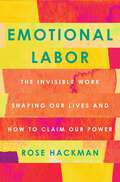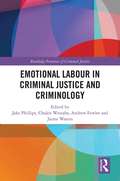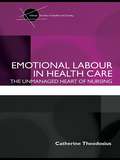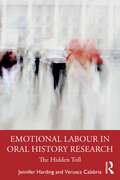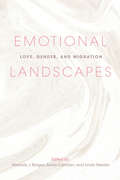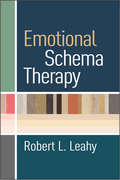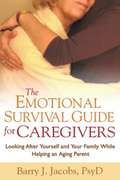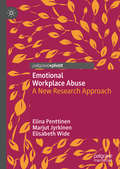- Table View
- List View
Emotion in Therapy
by Steven C. Hayes Stefan G. HofmannGrounded in cutting-edge scientific research, this book presents innovative ways to explore and work with emotions in psychotherapy. Preeminent clinician-researcher Stefan G. Hofmann accessibly explains how emotions operate, what influences them, and how they can cause distress. He presents strategies that can significantly improve existing evidence-based treatments and promote positive affect and happiness. Clinicians are guided to help clients with any diagnosis gain emotional awareness and use emotion regulation techniques, mindfulness-based practices, and other effective strategies. "In Practice" features highlight specific clinical issues and offer illustrative case vignettes.
Emotion in the Digital Age: Technologies, Data and Psychosocial Life (Routledge Studies in Science, Technology and Society)
by Darren Ellis Ian TuckerEmotion in the Digital Age examines how emotion is understood, researched and experienced in relation to practices of digitisation and datafication said to constitute a digital age. The overarching concern of the book is with how emotion operates in, through, and with digital technologies. The digital landscape is vast, and as such, the authors focus on four key areas of digital practice: artificial intelligence, social media, mental health, and surveillance. Interrogating each area shows how emotion is commodified, symbolised, shared and experienced, and as such operates in multiple dimensions. This includes tracing the emotional impact of early mass media (e.g. cinema) through to efforts to programme AI agents with skills in emotional communication (e.g. mental health chatbots). This timely study offers theoretical, empirical and practical insight regarding the ways that digitisation is changing knowledge and experience of emotion and affective life. Crucially, this involves both the multiple versions of digital technologies designed to engage with emotion (e.g. emotional-AI) through to the broader emotional impact of living in digitally saturated environments. The authors argue that this constitutes a psycho-social way of being in which digital technologies and emotion operate as key dimensions of the ways we simultaneously relate to ourselves as individual subjects and to others as part of collectives. As such, Emotion in the Digital Age will prove important reading for students and researchers in emotion studies, psychology, science and technology studies, sociology, and related fields.
Emotion – Feeling – Mood: Phenomenological and Pedagogical Perspectives (Phänomenologische Erziehungswissenschaft #12)
by Malte Brinkmann Johannes Türstig Martin Weber-SpanknebelThis volume provides systematic, interdisciplinary, and intercultural impulses for a phenomenological pedagogy of emotions, feelings, and moods without subordinating them to the logocentric dualism of emotion and rationality. Starting from foundational and cultural perspectives on pedagogical relations of education, learning, and Bildung, specific emotions in individual studies, as well as different approaches of important representatives of phenomenological research on emotions are presented. The contributions include pedagogical, philosophical, and empirical approaches to feelings, emotions, and moods, highlighting their fundamental importance and productivity for learning, Bildung, and education in different pedagogical institutions and fields.
Emotion, Affective Practices, and the Past in the Present (Key Issues in Cultural Heritage)
by Gary Campbell Margaret Wetherell Laurajane SmithEmotion, Affective Practices, and the Past in the Present is a response to debates in the humanities and social sciences about the use of emotion. This timely and unique book explores the ways emotion is embroiled and used in contemporary engagements with the past, particularly in contexts such as heritage sites, museums, commemorations, political rhetoric and ideology, debates over issues of social memory, and touristic uses of heritage sites. Including contributions from academics and practitioners in a range of countries, the book reviews significant and conflicting academic debates on the nature and expression of affect and emotion. As a whole, the book makes an argument for a pragmatic understanding of affect and, in doing so, outlines Wetherell’s concept of affective practice, a concept utilised in most of the chapters in this book. Since debates about affect and emotion can often be confusing and abstract, the book aims to clarify these debates and, through the use of case studies, draw out their implications for theory and practice within heritage and museum studies. Emotion, Affective Practices, and the Past in the Present should be essential reading for students, academics, and professionals in the fields of heritage and museum studies. The book will also be of interest to those in other disciplines, such as social psychology, education, archaeology, tourism studies, cultural studies, media studies, anthropology, sociology, and history.
Emotion, Identity and Death: Mortality Across Disciplines
by Chang-Won ParkDeath affects all aspects of life, it touches our emotions and influences our identity. Presenting a kaleidoscope of informative views of death, dying and human response, this book reveals how different disciplines contribute to understanding the theme of death. Drawing together new and established scholars, this is the first book among the studies of emotion that focuses on issues surrounding death, and the first among death studies which focuses on the issue of emotion. Themes explored include: themes of grief in the ties that bind the living and the dead, funerals, public memorials and the art of consolation, obituaries and issues of war and death-row, use of the internet in dying and grieving, what people do with cremated remains, new rituals of spiritual care in medical contexts, themes bounded and expressed through music, and more.
Emotion, Race, and Space in Contemporary African American Literature (American Literature Readings in the 21st Century)
by Marijana MikićThis open access book examines how selected African American authors—Colson Whitehead, Edward P. Jones, Toni Morrison, Brit Bennett, Percival Everett, Maurice Carlos Ruffin, Sherri L. Smith, and N.K. Jemisin—narrate relationships between emotion, race, and space. On the one hand, they bear witness to the structural production of Black emotional pain at the confluence of racial and spatial discrimination. On the other hand, they reveal meaningful and subversive interlinkages between Black emotional experiences and Black spatial practices. Weaving together insights from psychology, narrative theory, African American studies, affect theory, and Black Geographies, Marijana Mikić interrogates fear, hope, shame, guilt, anger, and grief in relation to the racial-geographic projects of slavery, Jim Crow segregation, and their continued legacies. Mikić draws attention to the narrative strategies contemporary African American authors employ to prompt their readers&’ engagement with both the pain and the possibility that continues to shape Black lives in the twenty-first century.
Emotion, Ritual and Power in Europe, 1200–1920: Family, State and Church (Palgrave Studies in the History of Emotions)
by Katie Barclay Merridee L. BaileyThis volume spans the fourteenth to nineteenth centuries, across Europe and its empires, and brings together historians, art historians, literary scholars and anthropologists to rethink medieval and early modern ritual. The study of rituals, when it is alert to the emotions which are woven into and through ritual activities, presents an opportunity to explore profoundly important questions about people’s relationships with others, their relationships with the divine, with power dynamics and importantly, with their concept of their own identity. Each chapter in this volume showcases the different approaches, theories and methodologies that can be used to explore emotions in historical rituals, but they all share the goal of answering the question of how emotions act within ritual to inform balances of power in its many and varied forms. Chapter 5 of this book is available open access under a CC BY 4.0 license.
Emotional AI: The Rise of Empathic Media
by Andrew McStayWhat happens when media technologies are able to interpret our feelings, emotions, moods, and intentions? In this cutting edge new book, Andrew McStay explores that very question and argues that these abilities result in a form of technological empathy. Offering a balanced and incisive overview of the issues raised by ‘Emotional AI’, this book: Provides a clear account of the social benefits and drawbacks of new media trends and technologies such as emoji, wearables and chatbots Demonstrates through empirical research how ‘empathic media’ have been developed and introduced both by start-ups and global tech corporations such as Facebook Helps readers understand the potential implications on everyday life and social relations through examples such as video-gaming, facial coding, virtual reality and cities Calls for a more critical approach to the rollout of emotional AI in public and private spheres Combining established theory with original analysis, this book will change the way students view, use and interact with new technologies. It should be required reading for students and researchers in media, communications, the social sciences and beyond.
Emotional AI: The Rise of Empathic Media
by Andrew McStayWhat happens when media technologies are able to interpret our feelings, emotions, moods, and intentions? In this cutting edge new book, Andrew McStay explores that very question and argues that these abilities result in a form of technological empathy. Offering a balanced and incisive overview of the issues raised by ‘Emotional AI’, this book: Provides a clear account of the social benefits and drawbacks of new media trends and technologies such as emoji, wearables and chatbots Demonstrates through empirical research how ‘empathic media’ have been developed and introduced both by start-ups and global tech corporations such as Facebook Helps readers understand the potential implications on everyday life and social relations through examples such as video-gaming, facial coding, virtual reality and cities Calls for a more critical approach to the rollout of emotional AI in public and private spheres Combining established theory with original analysis, this book will change the way students view, use and interact with new technologies. It should be required reading for students and researchers in media, communications, the social sciences and beyond.
Emotional Alterity in the Medieval North Sea World (Palgrave Studies in the History of Emotions)
by Daniel Anlezark Erin Sebo Matthew FirthThis book addresses a little-considered aspect of the study of the history of emotions in medieval literature: the depiction of perplexing emotional reactions. Medieval literature often confronts audiences with displays of emotion that are improbable, physiologically impossible, or simply unfathomable in modern social contexts. The intent of such episodes is not always clear; medieval texts rarely explain emotional responses or their motivations. The implication is that the meanings communicated by such emotional display were so obvious to their intended audience that no explanation was required. This raises the question of whether such meanings can be recovered. This is the task to which the contributors to this book have put themselves. In approaching this question, this book does not set out to be a collection of literary studies that treat portrayals of emotion as simple tropes or motifs, isolated within their corpora. Rather, it seeks to uncover how such manifestations of feeling may reflect cultural and social dynamics underlying vernacular literatures from across the medieval North Sea world.
Emotional Development across the Lifespan
by Linda A. CamrasUnique in its dual focus on emotion and lifespan development, this text weaves together theory, research, and practical clinical implications for fostering children's emotional well-being. The author examines how emotions are experienced, expressed, understood, and regulated from infancy through later adulthood, surveying both typical and atypical development. For each stage, chapters highlight the interrelated influences of temperament, neurobiology, and the social environment, and distinguish universal processes from those that vary across cultures. The book presents current knowledge about specific emotions, probes the causes and consequences of emotional maladjustment, and reviews evidence-based and promising interventions. Innovative methods, examples, and meta-analyses are described; key terms are defined within chapters and in an end-of-book glossary.
Emotional Ethics of The Hunger Games (Palgrave Film Studies and Philosophy)
by Tarja LaineEmotional Ethics of The Hunger Games expands the ‘ethical turn’ in Film Studies by analysing emotions as a source of ethical knowledge in The Hunger Games films. It argues that emotions, incorporated in the thematic and aesthetic organization of these films, reflect a crisis in moral standards. As such they cultivate ethical attitudes towards such phenomena as totalitarianism, the culture of reality television, and the society of spectacle. The focus of the argument is on cinematic aesthetics, which expresses emotions in a way that highlights their ethical significance, running the gamut from fear through guilt and shame, to love, anger and contempt. The central claim of the book is that these emotions are symptomatic of some moral conflict, which renders The Hunger Games franchise a meaningful commentary on the affective practice of cinematic ethics. ‘’The Hunger Games movies have become iconic symbols for resistance across the globe. Tarja Laine proposes that this is not caused by their status as exciting cinematic spectacles, but by their engaging our emotions. Laine uses The Hunger Games as key texts for understanding our world, demonstrating that ethics do not originate from rational considerations, far removed from those mucky things called emotions. But rather that emotions are at the core of cinematic ethics.”—William Brown, Author of Supercinema: Film-Philosophy for the Digital Age ‘’In this elegantly written exploration of the relationship between aesthetics and emotion in The Hunger Gamestrilogy, Tarja Laine illuminates the power of film to embody ethical conflict. Deftly interweaving film-philosophy and close analysis, Laine traces how these films mobilise complex emotions, nuancing our thinking about cinema and the spectator. Laine’s book takes The Hunger Games films seriously, demonstrating with verve why they matter.”—Catherine Wheatley, Senior Lecturer in Film Studies, King’s College London, UK ''In this fresh, engaging, and insightful study of The Hunger Games film trilogy, Tarja Laine explores the crucial role that emotions play in appreciation of the ethical qualities of the movies. She forges productive dialogues between a range of film theory, scholarship on moral philosophy, and debates on ethics, as she performs a multi-layered investigation of the aesthetic qualities of the trilogy, the multiple emotions embodied in these qualities, and the philosophical-ethical insights that are in turn embedded in these emotions. The cinematic connection between emotions and ethics that emerges through Laine’s detailed textual analyses confronts us with complex moral dilemmas while enriching our aesthetic experience.'' —Sarah Cooper, Professor, Film Studies Department, King's College London, UK
Emotional Experience and Microhistory: A Life Story of a Destitute Pauper Poet in the 19th Century (Microhistories)
by Sigurður Gylfi MagnússonEmotional Experience and Microhistory explores the life and death of Magnús Hj. Magnússon through his diary, poetry and other writing, showing how best to use the methods of microhistory to address complicated historical situations. The book deals with the many faces of microhistory and applies it’s methodology to the life of the Icelandic destitute pauper poet Magnús Hj. Magnússon (1892–1916). Having left his foster home at the age of 19 in 1892, he lived a peripatetic existence in an unstinting struggle with poor health, together with a ceaseless quest for a space to pursue writing and scholarship in accord with his dreams. He produced and accumulated a huge quantity of sources (autobiography, diary, poems, reflections) which are termed by the author as ‘egodocuments’. The book demonstrates how these egodocuments can be applied systematically, revealing unexpected perspectives on his life and demonstrating how integration of diverse sources can open up new perspectives on complex and difficult subjects. In so doing, the author offers an understanding both of how Magnússon’s story has been told, and how it can give insight into such matters as gender relations and sexual life, and the history of emotions. Highlighting how the historiographical development of modern scholarship has shaped scholars’ ideas about egodocuments and microhistory around the world, the book is of great use and interest to scholars of microhistory, social and cultural modern history, literary theory, anthropology and ethnology.
Emotional Geographies
by Liz BondiBringing together well-established interdisciplinary scholars - including geographers Phil Hubbard, Chris Philo and Hester Parr, and sociologists Jenny Hockey, Mike Hepworth and John Urry - and a new generation of researchers, this volume presents a wide range of innovative studies of fundamentally important questions of emotion. Following an overarching introduction, three interlinked sections elaborate key intersections between emotions and spatial concepts, on which each chapter offers a particular take informed by substantive research. At the heart of the collection lies a commitment to convey how emotions always spill over from one domain to another, as well as to illuminate the multiplicity of spaces that produce and are produced by emotional life. The book demonstrates the richness that an interdisciplinary engagement with the emotionality of socio-spatial life generates.
Emotional Heritage: Visitor Engagement at Museums and Heritage Sites
by Laurajane SmithEmotional Heritage brings the issues of affect and power in the theorisation of heritage to the fore, whilst also highlighting the affective and political consequences of heritage-making. Drawing on interviews with visitors to museums and heritage sites in the United States, Australia and England, Smith argues that obtaining insights into how visitors use such sites enables us to understand the impact and consequences of professional heritage and museological practices. The concept of registers of engagement is introduced to assess variations in how visitors use museums and sites that address national or dissonant histories and the political consequences of their use. Visitors are revealed as agents in the roles cultural institutions play in maintaining or challenging the political and social status quo. Heritage is, Smith argues, about people and their social situatedness and the meaning they, alongside or in concert with cultural institutions, make and mobilise to help them address social problems and expressions of identity and sense of place in and for the present. Academics, students and practitioners interested in theories of power and affect in museums and heritage sites will find Emotional Heritage to be an invaluable resource. Helping professionals to understand the potential impact of their practice, the book also provides insights into the role visitors play in the interplay between heritage and politics.
Emotional Intelligence in Education: Integrating Research with Practice (The Springer Series on Human Exceptionality)
by James D. Parker Donald H. Saklofske Kateryna V. KeeferThis book highlights current knowledge, best practices, new opportunities, and difficult challenges associated with promoting emotional intelligence (EI) and social-emotional learning (SEL) in educational settings. The volume provides analyses of contemporary EI theories and measurement tools, common principles and barriers in effective EI and SEL programming, typical and atypical developmental considerations, and higher-level institutional and policy implications. It also addresses common critiques of the relevance of EI and discusses the need for greater awareness of sociocultural contexts in assessing and nurturing EI skills. Chapters provide examples of effective EI and SEL programs in pre-school, secondary school, and university contexts, and explore innovative applications of EI such as bullying prevention and athletic training. In addition, chapters explore the implications of EI in postsecondary, professional, and occupational settings, with topics ranging from college success and youth career readiness to EI training for future educators and organizational leaders. Topics featured in this book include: Ability and trait EI and their role in coping with stress, academic attainment, sports performance, and career readiness.Implications of preschoolers’ emotional competence for future success in the classroom.Understanding EI in individuals with exceptionalities.Applications of school-based EI and SEL programs in North America and Europe.Policy recommendations for social-emotional development in schools, colleges and universities.Developing emotional, social, and cognitive competencies in managers during an MBA program.Emotional intelligence training for teachers.Cross-cultural perspective on EI and emotions. Emotional Intelligence in Education is a must-have resource for researchers, professionals, and policymakers as well as graduate students across such disciplines as child and school psychology, social work, and education policy.
Emotional Justice: A Roadmap for Racial Healing
by Esther A. ArmahIt is time for an emotional reckoning on our path to racial healing, sustainable equity, and the future of DEI. Here's the tool to help us navigate it. In this groundbreaking book, Esther Armah argues that the crucial missing piece to racial healing and sustainable equity is emotional justice-a new racial healing language to help us do our emotional work. This work is part of the emotional reckoning we must navigate if racial healing is to be more than a dream. We all-white, Black, Brown-have our emotional work that we need to do. But that work is not the same for all of us. This emotional work means unlearning the language of whiteness, a narrative that centers white people, particularly white men, no matter the deadly cost and consequence to all women and to global Black and Brown people. That's why a new racial healing language is crucial. Emotional Justice grapples with how a legacy of untreated trauma from oppressive systems has created and sustained dual deadly fictions: white superiority and Black inferiority that shape-and wound-all of us. These systems must be dismantled to build a future that serves justice to everyone, not just some of us. We are the dismantlers we have been waiting for, and emotional justice is the game changer for a just future that benefits all of us.
Emotional Labor: The Invisible Work Shaping Our Lives and How to Claim Our Power
by Rose HackmanFor readers of Fair Play by Eve Rodsky and Burnout by Emily Nagoski and Amelia Nagoski comes a scathing, deeply-researched foray into the invisible, uncompensated work women perform every day. We’re tired.A stranger insists you “smile more,” even as you navigate a high-stress environment or grating commute. A mother is expected to oversee every last detail of domestic life. A nurse works on the front line, worried about her own health, but has to put on a brave face for her patients. A young professional is denied promotion for being deemed abrasive instead of placating her boss. Nearly every day, we find ourselves forced to edit our emotions to accommodate and elevate the emotions of others. Too many of us are asked to perform this exhausting, draining work at no extra cost, especially if we’re women or people of color.Emotional labor is essential to our society and economy, but it’s so often invisible. In this groundbreaking, journalistic deep dive, Rose Hackman shares the stories of hundreds of women, tracing the history of this kind of work and exposing common manifestations of the phenomenon. But Hackman doesn’t simply diagnose a problem—she empowers us to combat this insidious force and forge pathways for radical evolution, justice, and change.Drawing on years of research and hundreds of interviews, you’ll learn:· How emotional labor pervades our workplaces, from the bustling food service industry to the halls of corporate America· How race, gender, and class unequally shape the load we carry· Strategies for leveling the imbalances that contaminate our relationships, social circles, and households · Empowering tools to stop anyone from gaslighting you into thinking the work you are doing is not real workEmotional labor is real, but it no longer has to be our burden alone. By recognizing its value and insisting on its shared responsibility, we can set ourselves free and forge a path to a world where empathy, love, and caregiving claim their rightful power.
Emotional Labour in Criminal Justice and Criminology (Routledge Frontiers of Criminal Justice)
by Jake PhillipsThis book is the first volume to explore criminal justice work and criminological research through the lens of emotional labour. A concept first coined 30 years ago, emotional labour seeks to explore the ways in which people manage their emotions in order to achieve the aims of their organisations, and the subsequent impact of this is on workers and service users. The chapters in this edited collection explore work in a wide range of criminal justice institutions as well as the penal voluntary sector. In addition to literature review chapters which consolidate what we already know, this book includes case study chapters which extend our knowledge of how emotional labour is performed in specific contexts, and in relation to certain types of work. Emotional Labour in Criminal Justice and Criminology covers topics such as prisoners who die from natural causes in prison, to the work of independent domestic violence advisors and the use of emotion by death penalty lawyers in the US. An accessible and compelling read, this book presents ground-breaking qualitative and quantitative research which will be critical to criminologists, criminal justice practitioners, students of criminology and academics in the fields of social policy and public service.
Emotional Labour in Health Care: The unmanaged heart of nursing (Critical Studies in Health and Society)
by Catherine TheodosiusDo nurses still care? In today’s inflexible, fast-paced and more accountable workplace where biomedical and clinical models dominate health care practice, is there room for emotional labour? Based on original empirical research, this book delves into personal accounts of nurses' emotion expressions and experiences as they emerge from everyday nursing practice, and illustrates how their emotional labour is adapting in response to a constantly changing work environment. The book begins by re-examining Arlie Hochschild’s sociological notion of emotional labour, and combines it with Margaret Archer’s understanding of emotion and the inner dialogue. In an exploration of the nature of emotional labour, its historical and political context, and providing original, but easily recognisable, typology, Catherine Theodosius emphasises that it is emotion – complex, messy and opaque – that drives emotional labour within health care. She suggests that rather than being marginalised, emotional labour in nursing is frequently found in places that are hidden or unrecognised. By understanding emotion itself, which is fundamentally interactive and communicative, she argues that emotional labour is intrinsically linked to personal and social identity. The suggestion is made that the nursing profession has a responsibility to include emotional labour within personal and professional development strategies to ensure the care needs of the vulnerable are met. This innovative volume will be of interest to nursing, health care and sociology students, researchers and professionals.
Emotional Labour in Oral History Research: The Hidden Toll
by Jennifer Harding Verusca CalabriaEmotional Labour in Oral History Research critically appraises the many complex ways in which emotion management features in oral history research and its specific implications for the researcher.Uniquely, this volume draws on oral historians’ personal accounts of conducting sensitive research and assesses the applicability of the term emotional labour to this work. It examines how oral historians may perform emotional labour, highlighting the often-hidden emotional toll it takes on them. This volume considers how the emotionally taxing implications of conducting sensitive research may be exacerbated or mitigated by the institutional relations and contexts in which the researcher works. The authors evaluate recommendations from related disciplinary fields for ways of supporting researchers and consider how an ethics of care can be fostered in local research environments. Emotional Labour in Oral History Research engages critically with theories of emotion, conceptualisations of emotional labour, questions of power and positionality, an ethics of care and debate on the impact of neoliberal ideas and policies on the higher education sector.This book will be of interest to all those using oral history to conduct sensitive research in all locations and at all career stages, including doctoral students, academics new to oral history, established oral historians, community-based oral historians and qualitative researchers in adjacent disciplines.
Emotional Landscapes: Love, Gender, and Migration (Studies of World Migrations #27)
by Donna R. Gabaccia Alexander Freund Marcelo J. Borges Elizabeth Zanoni A. James Hammerton Linda Reeder Sonia Cancian María Bjerg Tyler Carrington Margarita Dounia Mirjam Milharèiè Hladnik Emily Pope-Obeda Roberta Ricucci Suzanne M SinkeLove and its attendant emotions not only spur migration—they forge our response to the people who leave their homes in search of new lives. Emotional Landscapes looks at the power of love, and the words we use to express it, to explore the immigration experience. The authors focus on intimate emotional language and how languages of love shape the ways human beings migrate but also create meaning for migrants, their families, and their societies. Looking at sources ranging from letters of Portuguese immigrants in the 1880s to tweets passed among immigrant families in today's Italy, the essays explore the sentimental, sexual, and political meanings of love. The authors also look at how immigrants and those around them use love to justify separation and loss, and how love influences us to privilege certain immigrants—wives, children, lovers, refugees—over others. Affecting and perceptive, Emotional Landscapes moves from war and transnational families to gender and citizenship to explore the crossroads of migration and the history of emotion. Contributors: María Bjerg, Marcelo J. Borges, Sonia Cancian, Tyler Carrington, Margarita Dounia, Alexander Freund, Donna R. Gabaccia, A. James Hammerton, Mirjam Milharčič Hladnik, Emily Pope-Obeda, Linda Reeder, Roberta Ricucci, Suzanne M. Sinke, and Elizabeth Zanoni
Emotional Schema Therapy
by Robert L. LeahyOver decades of practice of cognitive-behavioral therapy (CBT), Robert L. Leahy has made important discoveries about the role that beliefs and expectations about emotions play in psychopathology. This book presents innovative tools for helping patients to understand their emotional schemas--such as the conviction that painful feelings are unbearable, shameful, or will last indefinitely--and develop new ways of accepting and coping with affective experience. Therapists can integrate emotional schema therapy into the treatment approaches they already use to add a vital new dimension to their work. Rich case material illustrates applications for a wide range of clinical problems; assessment guidelines and sample worksheets and forms further enhance the book's utility.
Emotional Survival Guide for Caregivers
by Barry Jacobs Steven ZaritCaring for a parent whose health is in decline turns the world upside down. The emotional fallout can be devastating, but it doesn't have to be that way. Empathic guidance from an expert who's been there can help. Through an account of two sisters and their ailing mother--interwoven with no-nonsense advice--The Emotional Survival Guide for Caregivers helps family members navigate tough decisions and make the most of their time together as they care for an aging parent. The author urges readers to be honest about the level of commitment they're able to make and emphasizes the need for clear communication within the family. While acknowledging their guilt, stress, and fatigue, he helps caregivers reaffirm emotional connections worn thin by the routine of daily care. This compassionate book will help families everywhere avoid burnout and preserve bonds during one of life's most difficult passages.
Emotional Workplace Abuse: A New Research Approach
by Elina Penttinen Marjut Jyrkinen Elisabeth WideAddressing emotional workplace abuse, this Palgrave Pivot takes a multidisciplinary approach which combines feminist research on violence with organisation and management studies, in order to offer a new approach on workplace violations. The book analyses why it is difficult for targets and organisations alike to name and identify emotional abuse and addresses the severe negative effects of abuse on the targets’ lives. It brings ethical leadership to the fore as a means to foster sustainable organisations. Using empirical data and research, this book highlights subtle forms of violations that take place in the workplace, and provides analysis from the perspective of the target. A valuable read for scholars and practitioners involved in organisational management and HRM, Emotional Workplace Abuse will help readers to understand the importance of sustainable leadership in preventing emotional workplace abuse.
